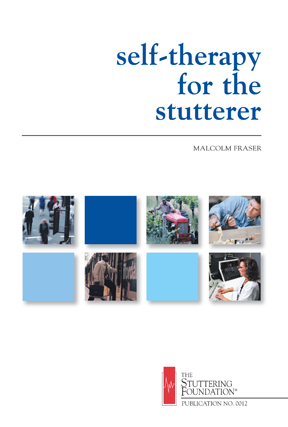 This is an excerpt from the book Self-Therapy for the Stutterer by Malcolm Fraser.
This is an excerpt from the book Self-Therapy for the Stutterer by Malcolm Fraser.Stutter openly and do not try to hide the fact that you stutter. Bring it into the open as there is no advantage in pretending that you are a normal speaker.1,2
Trying to hide your stuttering only helps to perpetuate it. Tell people with whom you talk that you are a stutterer and adopt an attitude of being willing to stutter voluntarily. If you adopt a frank and open attitude, it will help to reduce what shame and embarrassment you may have about your difficulty.
Feelings of shame and embarrassment only tend to increase your fear of difficulty. And fear of difficulty helps to build up tension or tightness in your speaking apparatus which aggravates your trouble.3,4,5
If stutterers did not try to hide the fact that they stutter, most of them would be less sensitive about their problem and, as a result, have much less difficulty. To desensitize yourself and increase your self-confidence is a difficult assignment as it will take time to get rid of your fear. However, the more you work at it, the happier you will be.
Practice openly the techniques you have learned to reduce the frequency and severity of your stuttering blocks. This should add to your ability to use them more easily.
Therefore, let’s work on reducing the fear you may have about your speech by willingly admitting to others that you are a stutterer. Find occasions to discuss it with those with whom you talk.6,7 Tell them you are working on your speech.
One objective of this important rule is to increase your ability to tolerate stress and build your self-confidence through desensitization.
As part of this guideline you will be encouraged to sometimes stutter voluntarily on purpose. By deliberately doing what you dread, you may be able to get some relief from the fear and tension which aggravate your problem.
1. The first thing you must become is an honest stutterer. (Starbuck)
2. Many stutterers will go to any lengths to conceal from others the fact that they stutter. There is great fear of losing face. (Murray)
3. If you are like all of the other adult stutterers I have known, you create, without meaning to, of course, a major share of any adjustment difficulties you may have…by trying to cover up, conceal or disguise the fact that you talk the way you do. (Johnson)
4. In order to reduce the amount of stuttering you do, you must reduce your fear of stuttering. (Trotter)
5. Your fear of stuttering is based largely on your shame and hatred of it. The fear is also based on playing the phony role pretending your stuttering doesn’t exist. You can do something about this fear if you have the courage. You can be open about your stuttering above the surface. You can learn to go ahead and speak anyway to go forward in the face of fear. (Sheehan)
6. They should cultivate the ability to discuss their stuttering casually and objectively with others. (Bloodstein)
7. You need to communicate more openly and easily with other people including being frank about your stuttering. (Boland)






 Podcast
Podcast Sign Up
Sign Up Virtual Learning
Virtual Learning Online CEUs
Online CEUs Streaming Video Library
Streaming Video Library